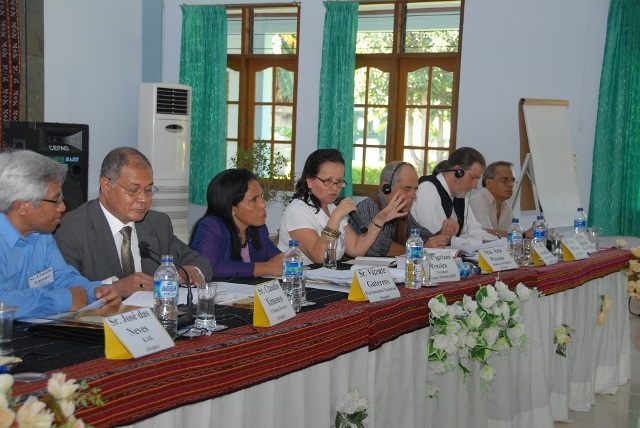Beating corruption: Timorese look for solutions

Corruption is seen to pervade every aspect of life in Timor-Leste. It was ranked 143 out of a total of 183 countries in Transparency International’s 2011 Corruption Perception Index. In just one year Timor-Leste had dropped down 18 notches from 125th position.
Corruption had also been identified, along with collusion and nepotism, as one of four issues that stands in the way of lasting peace by Timorese in a nationwide research initiative. Over 900 people from all sectors and levels of society had participated in the research that was conducted by Interpeace local partner, the Centre of Studies for Peace and Development, (CEPAD).
CEPAD Executive Director, Joao Boavida explains: ‘Commonly referred to in Timor as ‘KKN’ for ‘Corruption, Collusion and Nepotism’, it is seen to be a major cause of resentment, instability and perpetual crisis.’
Today, CEPAD held a national level conference in Dili on how to tackle the issue of corruption that is now perceived to be endemic.
‘We are looking to identify both feasible and sustainable solutions to address corruption in Timor. The focus of today’s conference was on how we can encourage greater political will to prevent and combat corruption,’ confirms Boavida.
The conference gathered representatives from government institutions and parliament, academia, civil society activists, politicians, religious institutions and activists.
They had come together to discuss the findings of the ‘KKN Working Group’ – a group made up of Timorese experts in this area. For five months the ‘Working Group’ had been looking at the local context within which KKN has now become a major source of concern. They had also canvassed opinions on how best to address it.
‘Weak institutional capacity and human resources, poor implementation of, and adherence to, legislation, lack of professional responsibility and individual opportunism were all cited by Timorese as critical obstacles to addressing corruption,’ clarifies Boavida. ‘But the Working Group members identified the perceived ‘lack of political will’ to investigate and prosecute cases as central to the problem.’
A comprehensive cause-effect analysis was shared by the ‘Working Group’ and the discussion that followed focused around three areas:
- How to clearly differentiate corruption as a criminal act requiring extraordinary legislative measures to ensure sound investigation and prosecution processes;
- How to collectively assess ‘political immunity’ and its perceived effects in preventing and combating corruption in Timor-Leste;
- How to put forward political immunity as stipulated under the Constitution for further reconsideration, should panelists and participants concur that this is indeed one of the chief obstacles to exposing the high-level prosecution of corrupt behavior.
Ana Pessoa, Prosecutor-General, shared with the audience her perspectives on ‘Successes and challenges in prosecuting KKN within the justice sector’. Vicente Guterres, Deputy President, National Parliament, tackled the issue of ‘Political immunity as an obstacle to combating KKN’. Obstacles to investigating KKN within the public service was shared by Cláudio de Jesus Ximenes, President of the Court of Appeal while Aderito de Jesus, Commissioner, CAC, presented his perspectives from the Anti-Corruption Commision. Luis Constantino, Country Director, World Bank closed the panel discussion by sharing the World Bank position on the issue.
‘It will take the courage and support of the whole Timorese population to tackle this very sensitive issue. But it has to happen. Endemic corruption is widely known to be undermining our institutions, it is hindering growth and contributing to potential instability,’ concludes Boavida.
